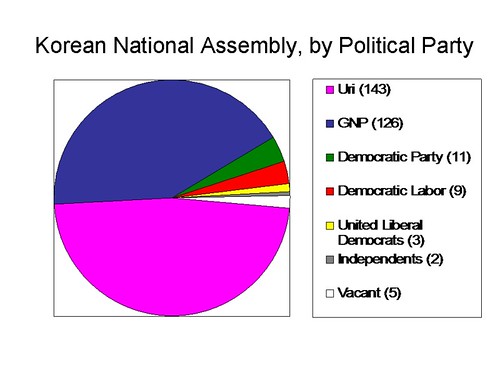Comrade Chung Dong Young Wins Uri Leadership
Via Kyodo news, Comrade Chung has won an early test of his strength going into the 2007 presidential race.
Chung, former unification minister, was elected by a vote at the party’s national convention in Seoul, defeating seven other candidates.
He garnered 4,450 votes, beating his main rival and former Health and Welfare Minister Kim Geun Tae who obtained 3,847 votes in the eight-man race, according to Yonhap News Agency.
“The Uri Party and I will fiercely compete with the (opposition) Grand National Party to resolve social polarization and establish a joint economic community on the Korean Peninsula. And I believe that is the public-oriented economy the people want,” Chung was quoted by Yonhap as saying in a victory speech.
Expect to hear more about “social polarization;” with the poor condition of the South Korean economy and the lack of forward progress with North Korea, it may be all Uri can run on, beyond the tired formula of anti-American and anti-Japanese nationalism. We’ve already seen this emerge as a Comrade Chung campaign theme, and the Korean TV news programs are now chock-full of muckraking stories about the gap between rich and poor. (Chung plans to pay for this social spending by cutting military spending, but the U.S. Congress may not be keen on spending billions on the defense of a nation that’s cutting its own defense spending; I’ve actually received e-mails from an influential congressional staffer to that effect).
What does this mean for Uri’s odds at the polls? I don’t know which is more interesting – that a figure like Kim Geun Tae of little national standing came close to knocking off Chung, or that Roh’s backing wasn’t even enough to make Kim Du Kwon a serious contender. Chung, a former newsreader, is clearly the more charismatic of the two, but Chung is severely handicapped by what was evident from this op-ed piece he wrote recently: his low intelligence and general shallowness. Chung’s room-temperature IQ is no secret among the journalists who’ve covered and met him.
Comrade Chung is also prone to jamming his foot into his mouth. Remember this, from the last time Chung was head of the Uri Party?
The head of a party on which South Korea’s impeached president has pinned his political fortunes apologized Friday for telling older voters to “stay home and rest” and let the young decide this month’s parliamentary elections.
Chung Dong-young’s remark, widely reported by domestic media and criticized by the conservative opposition, angered elderly voters in this deeply Confucian society that cherishes seniority.
“I made a big mistake while intending to urge people in their 20s and 30s to vote,” said Chung, the head of the small, liberal Uri Party. He later kneeled before a group of elderly men and bowed.
For several other reasons, it’s a blessing that someone as far to the left as Chung will be Uri’s standard-bearer. First, like Roh before him, Chung’s ascendancy may split the party and alienate the sort of moderate voters who might have found a centrist candidate like Goh Kun more appealing. Second, Chung is a candidate who arguably invites his GNP opponents to make an issue of human rights in North Korea; Comrade Chung is defenseless against that issue. Third, because of Comrade Chung’s close associations with the policy of appeasing the North, his candidacy will transform the presidential race into a referendum on the Sunshine / Peace-and-Prosperity policies, and trigger a needed national debate on its costs and benefits, both financial and moral.
The United States should pay careful attention to the results of that debate. If Chung wins, it would be difficult to justify the continuation of any form of military alliance with South Korea, ought then to be treated like any other neutral trading partner. If Chung is crushed, and crushed badly, it will mean that South Korea has stepped back from the brink toward reality, although a cold and rigorous reassessment of the U.S.-Korean strategic relationship would still be long overdue.
Meanwhile, here’s where I calculate things in the National Assembly, as we head toward parliamentary elections on May 31st:

Update: Typo fixed (thanks to a reader); chart also corrected.
2 Responses